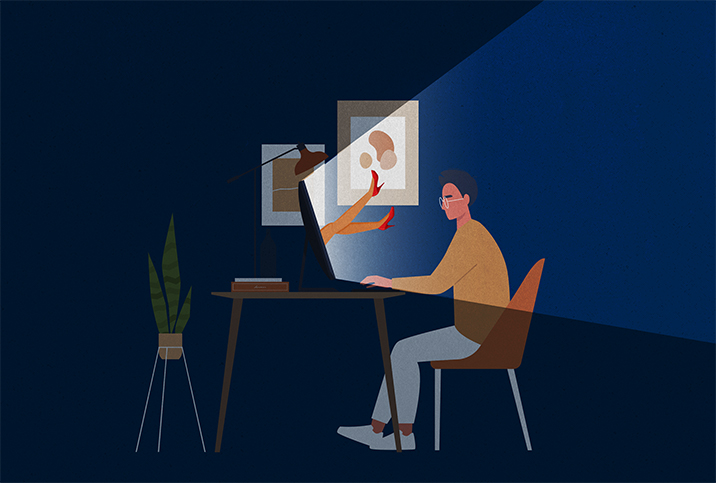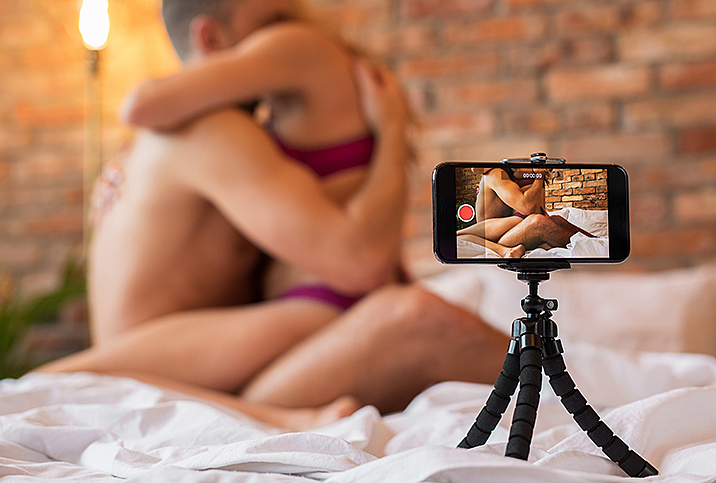Can You Really Get Hooked on Porn?

Brian, a 40-year-old project manager from Sydney, Australia, starts his mornings by jacking off. Before he gets out of bed, he grabs his phone and scrolls through sites like OnlyFans and XVideos, blowing his load after 10 to 20 minutes of porn-fueled jerking. Then, he gets on with working from home—until about lunchtime, when he'll usually treat himself to another midday porn blitz, especially if he's feeling "bored or low."
Brian calls these viewing sessions "fixes," and describes himself as "definitely addicted" to porn. He admits his habit was more extreme in his 20s, when he'd binge porn for "hours on end," but today he still struggles with sticking to self-imposed periods of abstention. "I started a daily one-hour mindful meditation practice and did weeks of retreats [to kick the habit], but I still keep lapsing back into porn brain," he said. "I try to go clean, but something always draws me back in."
Colin, a 23-year-old IT technician from Pennsylvania, is a fellow self-described porn addict: He has 30-minute sessions most days, sometimes multiple times in a day. "If I've already had one session in a day, I'm far more likely to do it again," he said. "If a day is already going to count against me, I might as well indulge."
But the problem with this indulgence is that Colin ends up hating himself for it. "I know some of my triggers, but if I don't catch them, I can spiral and end up sinking a lot of time into it," he said. "It can feel like a loss of control."
Recent data from Google Trends shows 'breakout growth' in search volume (rising by more than 5,000 percent) for terms like 'porn addiction' and 'porn addiction recovery.'
Brian and Colin are far from alone, both in their unhappy experiences and in the language of porn addiction they use to describe them. Recent data from Google Trends shows "breakout growth" in search volume (rising by more than 5,000 percent) for terms like "porn addiction" and "porn addiction recovery," and anxious porn viewers and abstaining "fapstronauts" congregate on forums like Reddit's NoFap, which currently has 843,000 predominantly male members, large swaths of whom openly identify as pornography addicts.
Meanwhile, advocates from media-friendly antipornography organizations like Fight The New Drug and The National Association for Research and Therapy of Homosexuality publicly argue that porn is "the new tobacco" and "does what heroin can't do."
Fapstronauts and antiporn organizers alike all take for granted that porn can fuel an addiction. But can it, really?
"The short answer is, it depends on how you define addiction," said Kris Taylor, Ph.D., a researcher at the University of Auckland in New Zealand, whose doctoral dissertation focused on this question. "If we're defining it as a feeling of being addicted, yes, people can feel that way. If it's an addiction like alcohol, no."
Part of the problem with the idea of porn addiction is that it's so subjective, involving a complex interplay with the viewer's moral, religious and political attitudes.
"People use metaphorical language—they say, 'I feel just like an alcoholic'—but the subjective experience of feeling compelled is not the same as a clinical diagnosis of being compelled," Taylor said. "Somebody who views pornography once a month and who feels really terrible and compelled can describe themselves as an addict, whereas someone who views it every single day and feels completely fine about it won't get the same diagnosis, which is not the same as for somebody who's taking drugs."
There has been some effort to create an objective framework for diagnosing compulsive sexual behavior: A proposed condition called Hypersexual Disorder—a repetitive and intense preoccupation with sexual fantasies, urges and behaviors, including pornography use, that causes adverse consequences and clinically significant distress or impairment in function—was considered for inclusion in the Diagnostic and Statistical Manual of Mental Disorders (DSM-5), for example. But the American Psychiatric Association ultimately decided to exclude it because the research was insufficient, according to a review by psychiatry professors Jon E. Grant and Samuel R. Chamberlain.
The complexity of these issues might be lost on a porn opponent steeped in the culture of communities like NoFap, which are generously peppered with language straight out of a 12-step program—terms like "relapse" and "rock bottom" are everywhere, as is the "My name is John, and I am a porn addict" introduction format. Elsewhere, antiporn organizations proclaim a scientific consensus on porn's addictiveness: For example, Fight The New Drug, an antiporn organization pumping out loads (sorry) of shareable content on porn's ills, claims on its site, "There are now over 35 neuroscience-based studies...that provide solid support for the reality of internet porn addiction."
But Taylor said these claims are "absurd," "completely political" and "total propaganda." Antipornography organizations cluster a bunch of studies on sex addiction or compulsive viewing and call it all "porn addiction," he explained, then misrepresent the modest or tentative conclusions of those studies, especially the fact that they show correlation, not causation. "It's very convincing, it makes it sound very scientific, it makes it sound like there's a lot of authority behind it," Taylor said. "But there's no consensus whatsoever that [pornography] is addictive."
Porn troubles
Whether you call it addiction or not, porn viewers can become intensely distressed by their habits. Brian said porn has "devastated" his relationship with sex, listing an inability to maintain erections, "fucked-up ideas of what's pleasurable" for his partners and intense sexual anxiety as detrimental effects of his compulsive viewing. The lead-up to partnered sex often leaves him feeling "breathless, shaky and cold," he said, and vaginal intercourse is "basically impossible" for him. "The longest penetrative sex I've ever had was with a girlfriend, three months in [to the relationship], and it lasted a minute or so," he continued. "I've never known a normal sex life."
Colin, for his part, feels intense self-loathing after watching porn. Partly this is due to guilt about what he calls "procrasturbation"—jacking off instead of achieving other goals, essentially—but he's also torn up about how porn performers are treated. "I tend to be more disgusted with myself after viewing porn than reading erotica because it feels like there's more potential for victims [in porn]," he said. "But in the heat of the moment, I overlook it, so there's a lot of shame there." Sometimes he watches porn without masturbating, which makes him feel even worse: He described this as "just mindlessly unethical."
But whether the addiction framework is useful for addressing these concerns is another question. "Clearly pornography makes some people feel very distressed," Taylor said. "I think the 'pornography addiction' label sells that distress short, because it doesn't actually address any of those underlying problems."
As a starting point for unpacking porn-related stress, Taylor recommends viewers pay close attention to their experience. "Everyone's source of distress will be different, and it's important for viewers to be mindful of where that sense of conflict or unease comes from," he said. "Is it religious? Is it moral? Is it a feeling of not enjoying what you're seeing, or is it an identification with the performers? Is it a way that the content you're viewing makes you feel differently about yourself as a person?"
But Taylor said it can be difficult to explore these questions openly, given the dominance of two competing cultural scripts about porn: On the one hand, it's treated as a male right of passage and a harmless joke; on the other, it's stigmatized as a life-ruining social problem and addictive drug, luring viewers into ever-more-extreme sexual hinterlands.
"Free-streaming internet pornography has been around for at least 20 years," Taylor said. "If there was this massive addictive potential or if [pornography] was going to desensitize people and cause them to seek increasingly hardcore stuff, then the 15-year-olds of yesteryear are now 35, and they would all be watching the most extreme possible content." Authors of a 2018 study published in The Journal of Sex Research actually found the opposite: Porn is less aggressive now than a decade ago, and viewers are less likely to view and favorably rank aggressive porn clips, preferring videos where women clearly perform pleasure.
"I think people tend to forget that time element," Taylor continued. "Pornography's been around for so long, and if it has these extreme effects, we'd definitely be seeing them now."
Decades of internet porn might not have spawned entire societies of PornHub-addled zombies, but it has certainly triggered intense and often unnuanced debate about the potential addictiveness of these videos—as well as thousands of discontents like Brian and Colin, who feel like pornography is at the root of their problems. "I started it young, so it's core to my development," Brain said. "It's framed how I see sex, it's mutated my ability to have sex and, for a decade, it skewed how I interacted with women and engaged in relationships. On that level of life-fuckery, it might be akin to some other addictions."


















